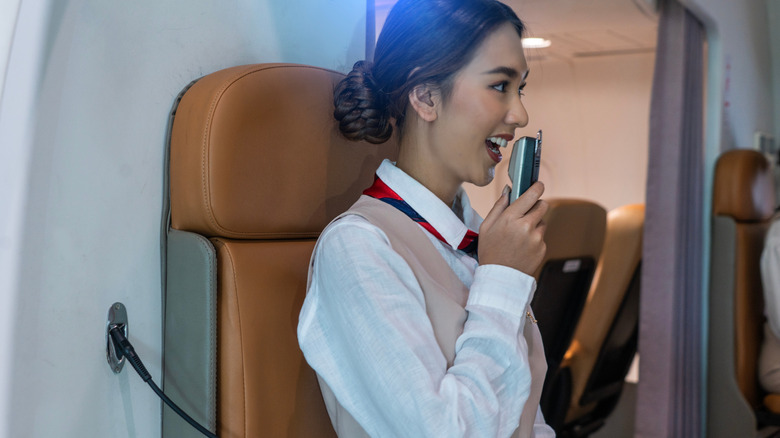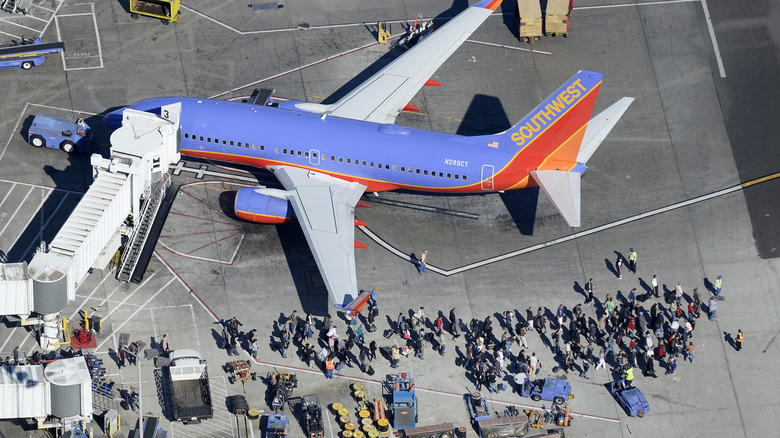Why Airline Announcements Always Sound So Redundant
If you've ever set foot on a commercial airplane, you've definitely experienced the long-winded announcements projected over the speakers for all passengers to hear. If you're a frequent flier, there's a good chance you could almost recite them by heart. Regardless of which airline you fly, the on-board announcements sound more or less the same. You'll be given information about how to board the plane smoothly, where to stow your luggage, and other practical information. The most important announcements are related to safety –– and you're going to hear them multiple times throughout your flight.
Airline safety announcements can be so mind-numbing that you may find yourself tuning them out relatively quickly, but flight attendants strongly advise against ignoring them completely. If you are listening, you may notice that different words that mean the same thing are often used simultaneously. While it may seem like overkill, there's a reason why they are redundant, and it may be a little freaky to some. It all has to do with safety. More than a hundred years have passed since the first commercial flight, and during that time experts have been able to study aviation safety practices and review information from many tragic aviation accidents. They've found that redundancy and repetition are keys to in-flight safety.
Repetition helps ensure in-flight safety
Some ill-informed travelers tend to view flight attendants as glorified sky severs. While part of their job is ensuring your comfort, they're actually there for your safety above all else. Flight crew members go through extensive training programs that usually last between four and eight weeks. A major emphasis is placed on learning the in-flight announcements, which exist to keep passengers safe. Before I was a travel writer, I worked as a flight attendant for nearly a decade. At my airline, we were required to learn every evacuation announcement by heart without missing a single word. The announcements are strategically worded to avoid confusion, and some of it is regulated by the Federal Aviation Administration (FAA), which gives airlines some freedom to personalize their in-flight announcements –– but other words and phrases must be spoken verbatim on every flight.
If you've ever flown during bad weather, you may have noticed that the seatbelt sign is turned on and off frequently, and you may have grown annoyed that the flight attendants announce over the PA system every time it turns on. That repetition is required by the FAA. Flight attendants are also required to say the announcement every so often for as long as the seatbelt sign remains illuminated, and repeat themselves until all passengers are compliant.
Every second counts during an evacuation, but panicked passengers may struggle to remove their seatbelts after an emergency landing. In an emergency, it may be easier to act quickly and effectively in a scary situation when you've recently heard the safety announcements –– which is why flight attendants repeat an announcement and do a safety demonstration showing how to wear and remove airplane seatbelts correctly before each flight.
Redundancy helps avoid dangerous mistakes and legal issues
The no-smoking announcement, which says, "Federal law prohibits tampering with, disabling, or destroying a smoke detector," is inarguably redundant, but it's also important that there is zero room for confusion. Fires are one of the most dangerous things that can happen on board an aircraft. Planes are highly flammable, and a small fire can fill the cabin with smoke in just a few minutes. If left uncontained, the entire plane could be ablaze before it's able to make an emergency landing. Redundancy ensures clarity, and it's also important for legal purposes in case someone breaks the law. Furthermore, it helps ensure that passengers who speak different languages have a better chance of understanding instructions. For example, a non-English speaker might not understand the word "tamper" but perhaps they will understand "disable."
Similarly, you may hear that seat backs and tray tables need to be "fully upright and locked" and that all items need to be stowed securely beneath the seat in front of you before take-off and landing. This announcement is crucial because in the event of an emergency evacuation, every second counts. While a seat back that is only slightly reclined may not seem like a big deal, if it impedes someone from exiting quickly. Or, if they trip and fall during an evacuation, it could be a matter of life and death. Every announcement you hear is strategically worded to reduce risks on board the aircraft. While they may seem frustrating or annoying — it's better to be safe than sorry.


